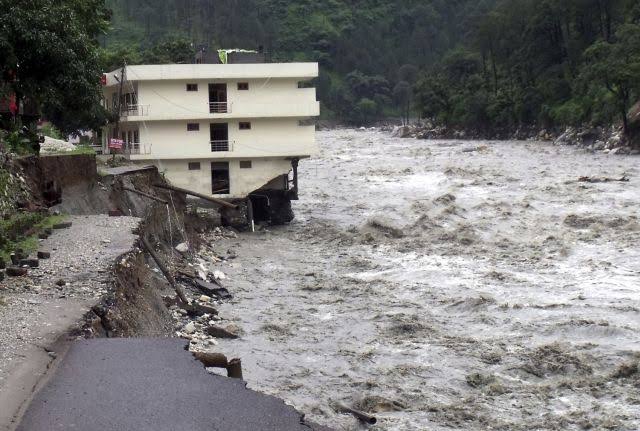Himalayan glacier breaks in India, around 125 missing in floods
New Delhi (Reuters) – Around 125 people were missing in northern India after a Himalayan glacier broke and swept away a small hydroelectric dam on Sunday, with floods forcing the evacuation of villages downstream.
A wall of dust, rock and water hit as an avalanche roared down the Rishiganga valley deep in the mountains of Uttarakhand, a witness said.
“It came very fast, there was no time to alert anyone,” Sanjay Singh Rana, who lives on the upper reaches of the river in Raini village, told Reuters by phone. “I felt that even we would be swept away.”
Uttarakhand Chief Minister Trivendra Singh Rawat said 125 people were missing but the number could rise. So far, the bodies of seven people had been recovered.
The disaster took place around 500 km (310 miles) north of New Delhi.
Uttarakhand is prone to flash floods and landslides and the disaster prompted calls by environment groups for a review of power projects in the ecologically sensitive mountains.
Earlier state chief secretary Om Prakash said 100 to 150 people were feared dead. A large number of the missing were workers at the 13.2 MW Rishiganga Hydroelectric Project which was destroyed by the bursting of the glacier.
Footage shared by locals showed the water washing away parts of the Rishiganga dam and everything else in its path. At least 180 sheep were washed away.
Videos on social media, which Reuters could not immediately verify, showed water surging through a small dam site, washing away construction equipment.
Twelve people who had been trapped in a tunnel had been rescued and efforts were under way to save others caught in another tunnel, the federal home ministry said after a meeting of the National Crisis Committee, comprising top officials.
“India stands with Uttarakhand and the nation prays for everyone’s safety there,” Prime Minister Narendra Modi said on Twitter.
State utility NTPC said the avalanche had damaged a part of its Tapovan Vishnugad hydropower plant that was under construction further down the river. It gave no details but said the situation is being monitored continuously.
Indian military helicopters were flying over the area and soldiers deployed for help with relief and rescue.
The neighbouring state of Uttar Pradesh, India’s most populous, put its riverside areas on high alert.
‘Himalayan Tsunami’
It was not immediately clear what had set off the avalanche at a time when it is not the flood season. In June 2013, record monsoon rains in Uttarakhand caused devastating floods that claimed close to 6,000 lives.
That disaster was dubbed the “Himalayan tsunami” because of the torrents of water unleashed in the mountainous area, which sent mud and rocks crashing down, burying homes, sweeping away buildings, roads and bridges.
Uma Bharti, India’s former water resources minister and a senior leader of Modi’s party, criticised the construction of a power project in the area.
“When I was a minister I had requested that Himalaya is a very sensitive place, so power projects should not be built on Ganga and its main tributaries,” she said on Twitter, referring to the main river that flows from the mountains.
Environmental experts called for a halt to big hydroelectric projects in the state.
“This disaster again calls for a serious scrutiny of the hydropower dams building spree in this eco-sensitive region,” said Ranjan Panda, a volunteer for the Combat Climate Change Network that works on water, environment and climate change issues.
“The government should no longer ignore warnings from experts and stop building hydropower projects and extensive highway networks in this fragile ecosystem.”



